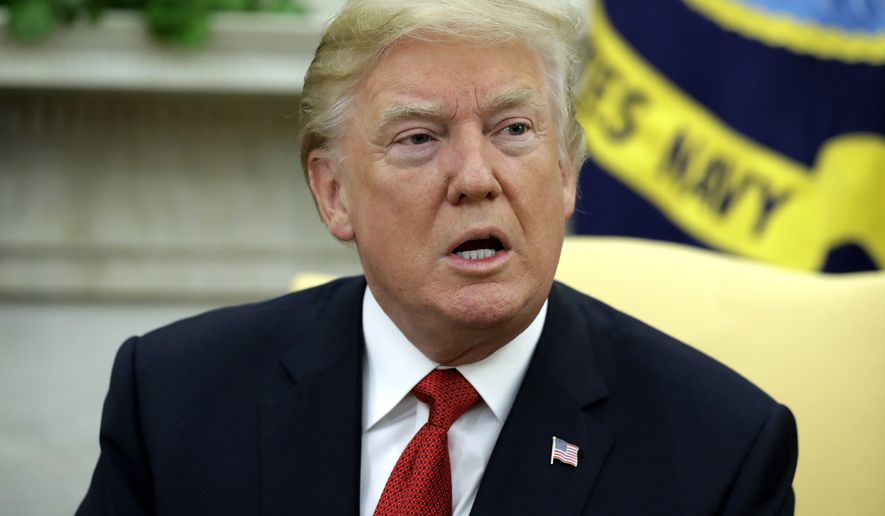The House intelligence committee is poised to gain substantial ground this week in its probe of federal investigators’ use of an intelligence dossier on President Trump that was developed through a private firm’s political opposition research.
An agreement struck this weekend with the company behind the dossier, Fusion GPS, will allow the committee access to bank records that could show how much money was spent on the research.
Meanwhile, the FBI is set this week to respond to the committee’s inquiries about how the bureau relied on information in the dossier as part of its own probe of Russian interference in the 2016 presidential election. The committee has sought to learn more about the bureau’s relationship with Christopher Steele, the British former spy who was paid by Fusion GPS to compile the dossier on Mr. Trump, and whether the dossier was used as the basis for any Foreign Intelligence Surveillance Act applications.
The dossier has played a major role in the Russian meddling saga that has gripped Washington all year as questions about who paid for it sparked partisan battles.
The Democratic National Committee, Hillary Clinton’s presidential campaign and the conservative website The Washington Free Beacon all confirmed last week that they paid Fusion GPS to conduct research on Mr. Trump during the 2016 presidential campaign. The parties came forward publicly as it became evident that their identities eventually would be disclosed as a result of the House committee’s subpoena for the bank records.
The Washington Free Beacon admitted Friday that it initially had hired Fusion GPS during the election cycle to dig up dirt on several Republican candidates, including Mr. Trump. But The Free Beacon’s editor in chief and chairman distanced the website from the compilation of the dossier, saying none of the work Fusion GPS produced for the website included the unsubstantiated and salacious accusations about Mr. Trump and his associates’ connections to Russian officials in the 35-page Steele dossier.
The Free Beacon reportedly hired Fusion GPS in October 2015 but stopped paying the firm in May 2016 after it became clear Mr. Trump would win the Republican nomination.
Law firm Perkins Coie came forward last week to confirm that it picked up funding for Fusion’s research into Mr. Trump on behalf of the Clinton campaign and the DNC between April and October 2016. It was during that period that Mr. Steele was brought on.
It’s unclear what new information the House intelligence committee’s subpoena for bank records will produce.
The initial subpoena, to which Fusion objected, sought all the company’s bank records since August 2015. House General Counsel Thomas G. Hungar told a judge that the committee needed access to a wide swath of financial records because it is investigating matters beyond the production of the dossier.
But U.S. District Judge Tanya Chutkan raised concerns about the breadth of the committee’s subpoena, including “its effect on activity and association protected by the First Amendment” and encouraged the House investigators to consider narrowing the scope of their requests.
The agreement the parties reached over the weekend was filed under seal in court, so it’s unclear how the subpoena may have been modified.
Officials representing both parties issued limited statements on the agreement. Jack Langer, a spokesman for intelligence committee Chairman Devin Nunes, said only that the parties reached an agreement on the bank records “that will secure the Committee’s access to the records necessary for its investigation.”
Fusion lawyer Joshua Levy said the company’s legal action “helped the company honor its legal obligations and protect its First Amendment rights,” and the court helped to “strike the balance between Congress’ right to information and our client’s privileges and legal obligations.”
The last subpoena deadline filed publicly in the court case indicated that the bank records needed to be turned over by 9 a.m. Monday. It was unclear whether a different deadline had been set as part of the confidential agreement.
The House intelligence committee also is set to obtain documents this week from the FBI that will shed light on how federal investigators used the information contained in the dossier as part of their investigations into Russian interference.
House Speaker Paul D. Ryan announced Thursday that the FBI had informed the committee it planned to turn over documents this week previously subpoenaed by the committee.
The battle over the records created friction between the Justice Department and congressional investigators, with Mr. Nunes previously threatening to drag the attorney general and the FBI director before Congress to explain why they had not provided the subpoenaed records.
The committee had asked for documents detailing the FBI’s relationship with Mr. Steele, any efforts to collaborate information he provided to the FBI as well as copies of any FISA applications that relied upon information provided by Mr. Steele.
• Dan Boylan can be reached at dboylan@washingtontimes.com.
• Andrea Noble can be reached at anoble@washingtontimes.com.




Please read our comment policy before commenting.